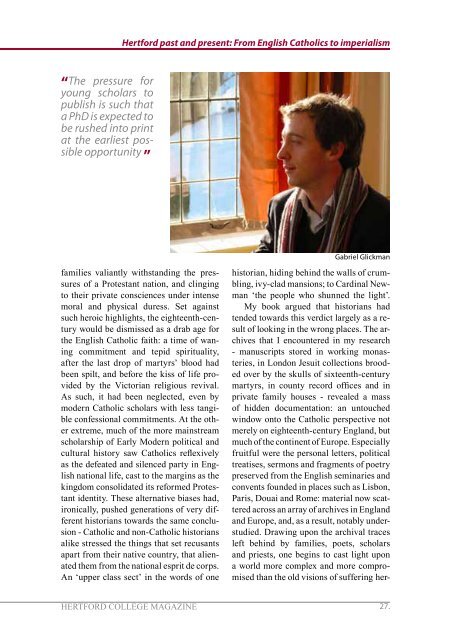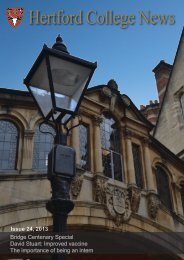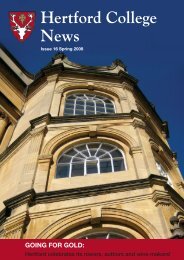2011 Hertford College Magazine (Issue 91)
2011 Hertford College Magazine (Issue 91)
2011 Hertford College Magazine (Issue 91)
You also want an ePaper? Increase the reach of your titles
YUMPU automatically turns print PDFs into web optimized ePapers that Google loves.
“ The pressure for<br />
young scholars to<br />
publish is such that<br />
a PhD is expected to<br />
be rushed into print<br />
at the earliest possible<br />
opportunity ”<br />
<strong>Hertford</strong> past and present: From English Catholics to imperialism<br />
families valiantly withstanding the pressures<br />
of a Protestant nation, and clinging<br />
to their private consciences under intense<br />
moral and physical duress. Set against<br />
such heroic highlights, the eighteenth-century<br />
would be dismissed as a drab age for<br />
the English Catholic faith: a time of waning<br />
commitment and tepid spirituality,<br />
after the last drop of martyrs’ blood had<br />
been spilt, and before the kiss of life provided<br />
by the Victorian religious revival.<br />
As such, it had been neglected, even by<br />
modern Catholic scholars with less tangible<br />
confessional commitments. At the other<br />
extreme, much of the more mainstream<br />
scholarship of Early Modern political and<br />
cultural history saw Catholics reflexively<br />
as the defeated and silenced party in English<br />
national life, cast to the margins as the<br />
kingdom consolidated its reformed Protestant<br />
identity. These alternative biases had,<br />
ironically, pushed generations of very different<br />
historians towards the same conclusion<br />
- Catholic and non-Catholic historians<br />
alike stressed the things that set recusants<br />
apart from their native country, that alienated<br />
them from the national esprit de corps.<br />
An ‘upper class sect’ in the words of one<br />
HERTFORD COLLEGE MAGAZINE<br />
Gabriel Glickman<br />
historian, hiding behind the walls of crumbling,<br />
ivy-clad mansions; to Cardinal Newman<br />
‘the people who shunned the light’.<br />
My book argued that historians had<br />
tended towards this verdict largely as a result<br />
of looking in the wrong places. The archives<br />
that I encountered in my research<br />
- manuscripts stored in working monasteries,<br />
in London Jesuit collections brooded<br />
over by the skulls of sixteenth-century<br />
martyrs, in county record offices and in<br />
private family houses - revealed a mass<br />
of hidden documentation: an untouched<br />
window onto the Catholic perspective not<br />
merely on eighteenth-century England, but<br />
much of the continent of Europe. Especially<br />
fruitful were the personal letters, political<br />
treatises, sermons and fragments of poetry<br />
preserved from the English seminaries and<br />
convents founded in places such as Lisbon,<br />
Paris, Douai and Rome: material now scattered<br />
across an array of archives in England<br />
and Europe, and, as a result, notably understudied.<br />
Drawing upon the archival traces<br />
left behind by families, poets, scholars<br />
and priests, one begins to cast light upon<br />
a world more complex and more compromised<br />
than the old visions of suffering her-<br />
27.




